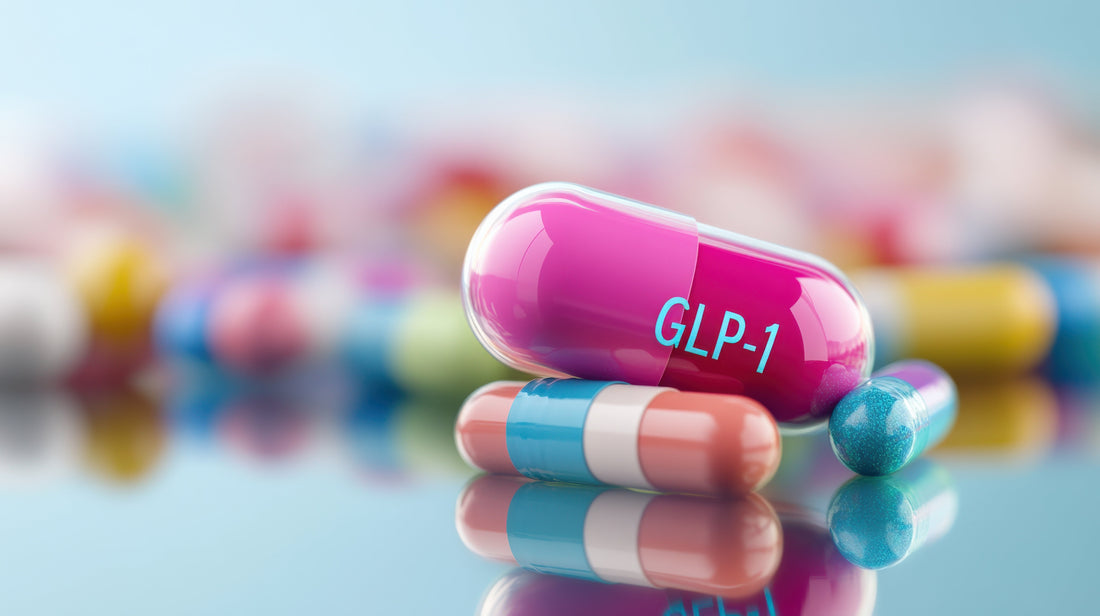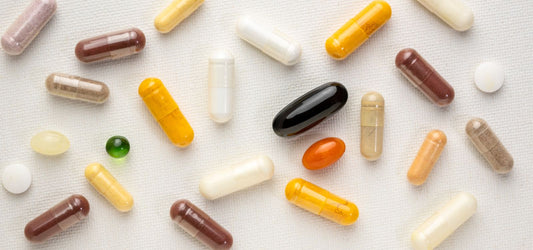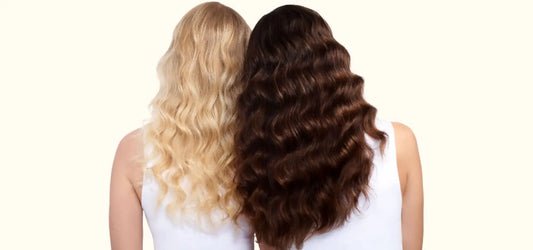Can GLP-1 Weight Loss Medications Cause Hair Loss?

SHOP this article
OMI
Hair Growth Peptides Capsules
Promote stronger hair growth and scalp health with our unique peptide formula.
The TV commercials. The earworm jingles. The friend or acquaintance whose weight loss appears sudden and significant. In recent years, a class of diabetes and weight loss medications called Glucacon-Like Peptide-1 Receptor Agonists (often referred to as GLP-1s and semaglutide) have transformed the landscape of weight management and type 2 diabetes care. Millions of people around the world are now turning to these drugs to regulate blood sugar, curb appetite and inflammation, and achieve sustainable weight loss. But with what many have deemed one of the most significant medical breakthroughs of our time, questions have emerged. One of the most pressing, and often anxiety-inducing, is whether GLP-1s are linked to hair loss.
The answer is complex. To better understand this connection, it’s important to explore how GLP-1 medications work, why they might support hair growth in some people while contributing to shedding in others, and how nutrition plays a critical role in protecting hair health.
This guide will take a deep dive into the relationship between GLP-1s and hair health, exploring both the science and the practical steps you can take to minimize risk while maximizing benefits.
Understanding GLP-1 Medications: From Diabetes Treatment to Weight Loss Revolution.
GLP-1 receptor agonists (GLP-1 RAs for short) are a class of drugs designed to mimic a natural hormone in the body known as glucagon-like peptide-1. This hormone plays an essential role in managing blood sugar levels and appetite regulation.
When you eat, GLP-1 helps your body release insulin, slows down digestion, and signals feelings of fullness to the brain. By reproducing these effects, GLP-1 medications help people eat less, feel satisfied longer, and maintain steadier blood sugar levels.
The result is often significant weight loss, but the benefits don’t stop there. GLP-1s also:
-
Reduce cardiovascular risks, including heart attack and stroke.
-
Improve metabolic health in conditions like polycystic ovary syndrome (PCOS).
-
Support insulin sensitivity and overall hormonal balance.
Given their wide-ranging benefits, it’s no surprise that the use of GLP-1s has skyrocketed, with over 1.1 million patients prescribed between 2018 and 2024.
Like any medication, however, GLP-1s come with side effects. Nausea, vomiting, and gastrointestinal issues are well-documented. But the concern over hair shedding is newer and worth unpacking.
The Science Behind GLP’s, Hair Health & Hair loss: The Mechanisms and Timeline
At first glance, it may seem counterintuitive to suggest that a drug associated with hair shedding could also support hair growth. But emerging research suggests exactly that: GLP-1 medications may have protective and even regenerative effects on hair follicles under certain conditions.
In fact, animal studies have revealed that GLP-1 receptors are present around hair follicles. When these receptors are stimulated, they activate pathways involved in cell growth, repair, and defense against damage. In theory, this means GLP-1s could strengthen hair follicles, making them more resistant to shedding and more capable of producing thick, healthy strands.
One striking example adds weight to this theory. In 2024, a case study documented the experience of a 57-year-old man with male-pattern baldness. After a year of weight loss injections with the GLP-1 medication Tirzepatide, he not only lost 30 pounds but also experienced dramatic improvement in hair density. His insulin resistance improved, his scalp looked healthier, and his hair growth was visibly thicker.
While a single case study cannot prove a clear correlation, it shows that in some individuals, GLP-1s may enhance hair growth instead of hindering it.
Potential GLP-1 Medication Benefits: Improved Circulation and Hormone Balance
Another factor in improved hair health is hormonal balance. Weight loss, particularly when gradual, can improve insulin sensitivity and help stabilize hormones like testosterone and estrogen. While excess testosterone is sometimes linked to hair thinning, the balance achieved through improved metabolic health may actually support scalp circulation and nutrient delivery. Better blood flow to the scalp ensures hair follicles receive the oxygen and nutrients needed to thrive.
Together, these factors create a strong case for GLP-1s as potential allies in hair health, at least for certain people.
Risk Factors and Individual Sensitivity: Why GLP-1s Can Also Trigger Hair Loss
Still, there’s no denying that many patients report increased hair shedding and hair thinning after starting GLP-1 therapy. The reasons for this are multifaceted and highlight how delicate the balance of hair growth truly is. The stress of rapid weight loss is believed to be a significant factor. One of the hallmark effects of GLP-1 medications is rapid weight loss which the body interprets as a stress event.
Here’s how it works. When the body experiences stress, whether from illness, surgery, or a dramatic dietary change, it often conserves energy by diverting resources away from “nonessential” functions like hair growth. This disruption can cause many hairs to prematurely enter the telogen phase, the resting stage of the hair cycle. A few months later, these hairs shed all at once, a condition known as telogen effluvium (TE).Though temporary, TE can feel alarming, especially when shedding is significant.
Beyond the stress response, GLP-1s may also influence key hormone pathways more directly. Research suggests they can lower levels of insulin-like growth factor 1 (IGF-1), a protein critical for normal follicle function. With less IGF-1, the growth phase of hair shortens, producing thinner, weaker strands.
Clinical Evidence and Real World Data: What the Research Actually Shows
Clinical trials paint a complicated picture:
-
In one review, 7% of people taking oral semaglutide reported hair loss, compared to just 0.3% in the placebo group.
-
Interestingly, those receiving injectable semaglutide showed much lower rates of hair loss, suggesting that drug delivery methods may play a role.
-
Tirzepatide, which targets multiple hormone pathways, may have a stronger association with shedding. Yet other studies show GLP-1s could actually reduce the risk of hair loss compared to other diabetes drugs.
The mixed results underscore the complexity of the relationship, and the fact that hair loss on GLP-1s may be highly individualized.
The Overlooked Role of Nutrition
Perhaps the most important factor in the GLP-1 and hair loss conversation is nutrition.
Hair growth is one of the body’s most metabolically demanding processes. Follicles require a continuous supply of protein, vitamins, minerals, and healthy fats to build keratin and keep growth cycles moving smoothly. When nutrient intake drops, even temporarily, hair often suffers first.
Because GLP-1s work by suppressing appetite, people may unintentionally eat fewer calories and, more importantly, fewer nutrients. This can exacerbate pre-existing deficiencies common in individuals with obesity and diabetes, such as low iron, vitamin D, or zinc. Without proper nutritional support, hair follicles become vulnerable, and shedding becomes more likely.
The Building Blocks of Hair: Key Nutrients to Focus On
To safeguard your hair while on GLP-1 therapy, it’s essential to prioritize a diet rich in the following nutrients:
Protein and Amino Acids
Hair is made primarily of keratin, a protein built from amino acids. Without a steady supply of protein, hair becomes weak and brittle. Experts recommend 1–2 grams of protein per kilogram of body weight daily. For a 70 kg (154 lb) adult, that means 70–140 grams per day.
Excellent sources include eggs, lean meats, fish, beans, lentils, tofu, and Greek yogurt. A great way to support keratin production is to also consider incorporating OMI Hair Growth Peptides which contain patented IFP Hair Growth Factor™, a patented form of keratin peptides clinically shown to reduce hair loss and promote hair follicle anchoring.
Iron
Iron deficiency is one of the most common and most overlooked causes of hair loss worldwide. Women, especially those with heavy periods, are at greater risk. During pregnancy, iron demands rise even further.
Good sources include red meat, chicken, and fish. Plant-based eaters can turn to spinach, lentils, and beans, but should pair them with vitamin C-rich foods (like oranges or kiwi) to boost absorption.
Zinc
Zinc is essential for DNA repair and new cell growth. A lack of zinc often leads to noticeable shedding. Oysters, beef, chicken, nutritional yeast, and peanuts are all great choices.
B Vitamins (Niacin and Biotin)
Niacin supports blood flow to the scalp, while biotin helps process proteins for keratin production. Deficiencies are rare but can cause brittle hair and nails. Salmon, liver, eggs, sweet potatoes, and almonds are excellent sources.
Omega-3 and Omega-6 Fatty Acids
Healthy fats are vital for scalp hydration and follicle resilience. Fatty fish like salmon, chia seeds, walnuts, and flaxseed oil are top picks.
Selenium
This trace mineral protects follicles from oxidative stress, which can damage hair growth at the root. Brazil nuts are one of the richest sources.
Vitamins A and E
Vitamin A regulates scalp oil production, while vitamin E shields follicles from free radical damage. Leafy greens, carrots, almonds, avocado, and wheat germ oil are excellent options.
Folic Acid
Folic acid supports red blood cell production, which indirectly sustains hair by ensuring follicles get oxygen. Beans, lentils, and leafy greens like spinach are great choices.
Prevention and Management Strategies: How to Protect Your Hair While on GLP-1s
The good news is that hair shedding linked to GLP-1s is often temporary and reversible. By taking proactive steps, you can minimize the risk and support stronger, healthier hair throughout your weight loss journey.
1. Aim for Gradual Weight Loss
Rapid drops in weight increase the likelihood of telogen effluvium. Work with your doctor to target steady, sustainable weight loss, which is easier on your body and your hair.
2. Prioritize Protein and Nutrients
Don’t let appetite suppression prevent you from eating balanced meals. Build each plate around lean proteins, colorful vegetables, and healthy fats. If your appetite is low, consider smaller, nutrient-dense meals rather than large portions.Chew your food slowly too—consider this an opportunity to savor every bite rather
3. Monitor Micronutrients
Ask your doctor about checking levels of iron, zinc, vitamin D, and B vitamins, especially if you notice more shedding. Supplements may be needed if dietary intake is insufficient.
4. Manage Stress
Hair loss can be worsened by emotional stress. Incorporating stress-reduction practices such as meditation, yoga, or even daily walks can help reduce the burden on your body.
5. Be Patient
Most cases of hair shedding related to weight loss resolve within six to nine months. Hair follicles typically recover once the body adapts to its new metabolic state.
The Takeaway
GLP-1 medications are groundbreaking tools in the fight against diabetes and obesity. While they may trigger hair shedding in some individuals, they may also improve hair density in others. The difference often lies in the speed of weight loss, hormonal balance, and nutritional support.
If you’re experiencing shedding, don’t panic. For most people, the condition is temporary and reversible. By prioritizing nutrient-rich meals, incorporating anchoring-promoting peptides, aiming for steady weight loss, and working closely with your healthcare provider, you can protect your hair health while enjoying the life-changing benefits of GLP-1 therapy.
Chew your food slowly as well—this helps with healthy digestion and allows you to savor every bite.
Frequently Asked Questions
Does taking GLP-1 medications always cause hair loss?
If I notice shedding on GLP-1s, will my hair grow back?
How can I protect my hair while taking GLP-1 medications?
References
- 1. Gratzl S, Rodriguez PJ, Goodwin BM, Baker C, Stucky N. Monitoring Report: GLP-1 RA Prescribing Trends - December 2023 Data. medRxiv (Cold Spring Harbor Laboratory). Published online January 22, 2024.
- 2. Filippatos TD, Panagiotopoulou TV, Elisaf MS. Adverse Effects of GLP-1 Receptor Agonists. Rev Diabet Stud. 2014;11(3-4):202-230. doi:10.1900/RDS.2014.11.202
- 3. Burke OM, Sa B, Cespedes DA, Tosti A. Dermatologic Implications of GLP-1 Receptor Agonist Medications: A Comprehensive Review. Skin Appendage Disorders. Published online February 14, 2025:1-14.
- 4. List JF, He H, Habener JF. Glucagon-like peptide-1 receptor and proglucagon expression in mouse skin. Regul Pept. 2006;134(2-3):149-157. doi:10.1016/j.regpep.2006.02.007
- 5. Gordon ER, Musleh S, Bordone LA. Treatment of insulin resistance with tirzepatide leading to improvement of hair loss. JAAD Case Reports. 2024;50:123-125.
- 6. Faurschou A, Pedersen J, Gyldenløve M, et al. Increased expression of glucagon-like peptide-1 receptors in psoriasis plaques. Exp Dermatol. 2013;22(2):150-152. doi:10.1111/exd.12081
- 7. Karacabeyli D, Lacaille D. Glucagon-Like Peptide 1 Receptor Agonists in Patients With Inflammatory Arthritis or Psoriasis: A Scoping Review. J Clin Rheumatol. 2024;30(1):26-31. doi:10.1097/RHU.0000000000001949
- 8. Chi CC, Lee CY, Liu CY, Wang SH, Tien O'Donnell F, Tung TH. Effects of antidiabetic drugs on psoriasis: A meta-analysis. Eur J Clin Invest. 2021;51(2):e13377. doi:10.1111/eci.13377
- 9. Chang G, Chen B, Zhang L. Efficacy of GLP-1rA, liraglutide, in plaque psoriasis treatment with type 2 diabetes: a systematic review and meta-analysis of prospective cohort and before-after studies. J Dermatolog Treat.
- 10. Al-Badri MR, Azar ST. Effect of glucagon-like peptide-1 receptor agonists in patients with psoriasis. Ther Adv Endocrinol Metab. 2014;5(2):34-38. doi:10.1177/2042018814543483
- 11. Haran K, Johnson CE, Smith P, et al. Impact of GLP-1 Receptor Agonists on Psoriasis and Cardiovascular Comorbidities: A Narrative Review. Psoriasis (Auckl). 2024;14:143-152. Published 2024 Nov 15. doi:10.2147/PTT.S485061
- 12. Vilarrasa E, Nicolau J, de la Cueva P, et al. [Translated article] Glucagon-Like Peptide-1 Agonists for Treating Obesity in Patients With Immune-Mediated Skin Diseases. Actas Dermo-Sifiliográficas. Published online October 31, 2023.
- 13. Nicolau J, Nadal A, Sanchís P, Pujol A, Nadal C, Masmiquel L. Effects of liraglutide among patients living with psoriasis and obesity. Medicina Clínica (English Edition). 2023;161(7):293-296.
- 14. Lal K, Herringshaw E. The Use of GLP-1 Agonists in the Management of Cutaneous Disease. J Clin Aesthet Dermatol. 2024;17(9):34-37.
- 15. DeVore S, Reimer H, Meihofer A, Miner K, Martinez G. A Systematic Review of the Cutaneous Adverse Effects of GLP-1 Agonists. ARC Journal of Dermatology. 2025;8(2):48-58.
- 16. Kang, D. H., Kwon, S. H., Sim, W. Y., & Lew, B. L. (2024). Telogen Effluvium Associated With Weight Loss: A Single Center Retrospective Study. Annals of dermatology, 36(6), 384–388.
- 17. Panchaprateep R, Asawanonda P. Insulin-like growth factor-1: roles in androgenetic alopecia. Exp Dermatol. 2014 Mar;23(3):216-8. doi: 10.1111/exd.12339. PMID: 24499417.
- 18. Desai DD, Sikora M, Nohria A, Bordone L, Caplan AS, Shapiro J, Lo Sicco KI. GLP-1 agonists and hair loss: a call for further investigation. Int J Dermatol. 2024 Sep;63(9):1128-1130. doi: 10.1111/ijd.17246. Epub 2024 May 13. PMID: 38741261
- 19. Moll H, Frey E, Gerber P, Geidl B, Kaufmann M, Braun J, Beuschlein F, Puhan MA, Yebyo HG. (2024). GLP-1 receptor agonists for weight reduction in obesity without diabetes: a living benefit-harm modelling study. EClinicalMedicine, 73, 102661.
- 20. Nakhla M, Nair A, Balani P, Ujjawal A, Kumar P, Dasari M, et al. (2024). Risk of suicide, hair loss & aspiration with GLP-1 receptor agonists & other diabetic agents: a pharmacovigilance study. Cardiovasc Drugs Ther. doi:10.1007/s10557-024-07613-w.
- 21. Guo EL, Katta R. Diet and hair loss: effects of nutrient deficiency and supplement use. Dermatol Pract Concept. 2017;7(1):1-10. Published 2017 Jan 31.
- 22. Almohanna HM, Ahmed AA, Tsatalis JP, Tosti A. The Role of Vitamins and Minerals in Hair Loss: A Review. Dermatol Ther (Heidelb). 2019;9(1):51-70. doi:10.1007/s13555-018-0278-6
- 23. VanBuren CA, Everts HB. Vitamin A in Skin and Hair: An Update. Nutrients. 2022;14(14):2952. Published 2022 Jul 19. doi:10.3390/nu14142952
- 24. Baddam S, Khan KM, Jialal I. Folic Acid (Folate) Deficiency. Nih.gov. Published June 26, 2023.
- 25. World Health Organization. Iron Deficiency Anaemia: Assessment, Prevention, and Control. A Guide for Programme Managers. Geneva: World Health Organization; 2001.
- 26. Pavord S, Myers B, Robinson S, Allard S, Strong J, Oppenheimer C. UK guidelines on the management of iron deficiency in pregnancy. Br J Haematol. 2012;156(5):588-600.
- 27. Milman N. Iron deficiency and anaemia in women. Acta Haematol. 2011;125(3):118-127.
- 28. Wu G. Dietary protein intake and human health. Food Funct. 2016;7(3):1251-1265.
- 29. Avila Rodríguez MI, Rodríguez Barroso LG, Sánchez ML. Collagen: a review on its sources and potential cosmetic applications. J Cosmet Dermatol. 2018;17(1):20-26.
- 30. Kielty CM, Sherratt MJ, Shuttleworth CA. Elastic fibres. J Cell Sci. 2002;115(Pt 14):2817-2828.
- 31. Rogers MA, Langbein L, Praetzel S, Winter H, Schweizer J. Human hair keratin-associated proteins (KAPs). Int Rev Cytol. 2006;251:209-263.









